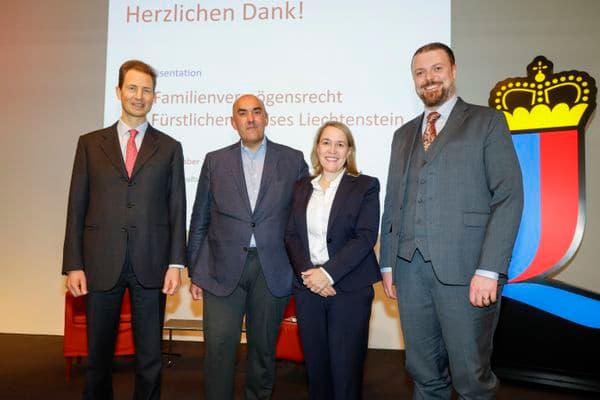Book presentation: ‘The Family Property Law of the Princely House’
On Tuesday, 11 November 2025, the Chair of Corporate, Foundation and Trust Law invited guests to the auditorium of the University of Liechtenstein for the book presentation of the legal study ‘The Family Property Law of the Princely House of Liechtenstein’. In front of an audience of around 90 interested participants, Prof. Dr. Anatol Dutta, M. Jur. (Oxford) provided an insight into his work and described his methodological approach.
The evening event was moderated by Prof. Dr. Alexandra Butterstein, LL.M., Professor of Corporate, Foundation and Trust Law at the University of Liechtenstein. In her welcome address, she pointed out from a legal history perspective that the subject matter addressed by Prof. Dr. Anatol Dutta was still an integral part of legal education in the German legal system until the beginning of the 20th century. In this respect, the study addresses one of the last house rights in the world and places it in a context of inheritance and family law, which makes the book particularly unique.
It was a special honour that H.S.H. Hereditary Prince Alois von und zu Liechtenstein then addressed the audience with a welcoming speech. H.S.H. Hereditary Prince Alois expressed his gratitude for the comprehensive academic examination of princely domestic law, which has enabled his family to preserve the princely assets of the House of Liechtenstein for generations.
In his remarks, Prof. Dr. Anatol Dutta then explained the long period of family entailment, which initially shaped the property regime. He described the need for a reorganisation of the family property under Prince Joseph II and the current regime, which is characterised by remarkable continuity. Unwritten private princely law forms the basis for family property-related domestic law, the continued existence of which in Liechtenstein law remains an exception in the European legal sphere to this day – thanks in part to a dualistic constitution that preserves monarchical roots and combines them with powerful (direct) democratic elements. Unlike bourgeois families, the Princely House is a legal entity that, due to its domestic autonomy, can set private law rules for its members.
